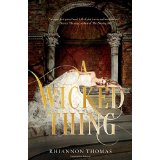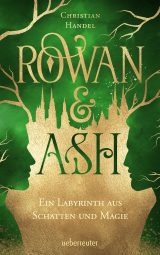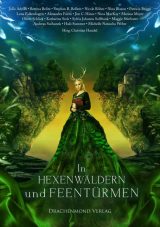 A sleeping curse, a spinning wheel, a lonely princess – as a big fairy tale fantasy fan I had to grab “A Wicked Thing“, the debut novel from British Author Rhiannon Thomas.
A sleeping curse, a spinning wheel, a lonely princess – as a big fairy tale fantasy fan I had to grab “A Wicked Thing“, the debut novel from British Author Rhiannon Thomas.
Not only draws the fantasy novel heavily on the Sleeping Beauty fairy tale, it also takes it a few steps further, beginning at a point where most adaptions end: Beauty awakes. But the world she used to know is no longer. In “A Wicked Thing” Rhiannon Thomas explores what happens after “happily ever after”. In the following interview the author discusses fairy tales, feminist fiction, romance in YA novels and many other things.
Interview with Rhiannon Thomas
What compelled you to write a story about Sleeping Beauty?
In most versions of Sleeping Beauty, including the Disney adaptation, the princess isn’t really a character in her own right. She gets cursed, she sleeps, a prince wakes her, but we never find out who she is or what she wants. I wanted to take a peek inside her head and explore who she might be and how she might react to this life-changing curse.
Did you call your heroine Aurora as a nod to Disney?
I wanted my heroine to appear to be as traditional a Sleeping Beauty as possible, and her name was part of that. “Aurora“ is Sleeping Beauty’s name in both the Disney movie and the Tchaikovsky ballet, so it felt like an easy way to ground my retelling in the familiar fairy tale world.
I really loved that although a few young men start to play important parts in Auroras new life, you focus on the non-romantic relationships. In this genre, a romantic plot seems to be mandatory. Did you feel any pressure in this area. You could have easily gone for a love triangle but you decided against it. Can you explain why?
You know, some people have commented that the book has a love triangle, or even a love rectangle, because there are multiple potential love interests for Aurora, but I’ve never thought of it that way. Aurora never looks around at all the guys in her life and agonizes over which one she wants to be with the most. All her relationships are quite politically charged, and there’s hardly anyone in her life who doesn’t have some ulterior motive for befriending her.
My editor did ask me to play up the romance a little bit more, which I was happy to do. I love a good romance thread in a novel. I just felt that, considering how lost Aurora is, she wouldn’t be jumping into an epic love story, and if she DID like someone, it would be based more on her own hopes than on the actual relationship between them. After all, she’s meeting every character in the book for the first time, while adjusting to a completely unfamiliar world and trying to figure out her own place in it. Some of the people around her may have some appeal, but it’s hardly solid grounding for any relationship, as Aurora discovers.
One of the most fascinating characters for me is Queen Iris. How hard was it to not overstep the balance in showing her both as a villain and as a damaged character herself, without making her weak?
Iris’s character actually came quite naturally to me, which made her really enjoyable to write. When I started, I wasn’t sure who she was going to be, except that she was Aurora’s apparent captor. But the more I wrote, the more sympathetic she became to me.
Aurora might think that she’s cruel, but she does try to help and protect Aurora to the best of her ability. She just has very different opinions from Aurora on what it will take for her to survive. But I didn’t let myself worry too much about her seeming too cruel or, conversely, too weak – I wanted to paint her as human, with all her flaws, and just let people think of her what they would.
Are you a fairy tale fan yourself? What is your favorite one?
I love fairy tales!
Right now, I have a soft spot for The Three Spinners, just because it’s completely different from any other fairy tale I’ve heard. A lazy, spoiled girl is locked in a room in a palace and told to spin flax for a chance to marry the prince. She never bothered to learn how to spin, but three deformed old women appear and offer to spin it for her, as long as they get an invite to the wedding. She agrees, everything goes according to plan, and when the three spinners meet the king at the wedding, they tell him that all their deformities are from spinning too much. The king then forbids the girl from ever spinning again, so she gets everything she wants, doesn’t have to work for it, and is never punished at all.
It’s the only fairy tale deal I can think of that goes WELL for the person involved, and where laziness is rewarded.
You are owner of a blog called FEMINIST FICTION. Could you explain to us what your blog is about?
Feminist Fiction is a blog that looks at pop culture and the media from a feminist perspective. I’ve run it for over three years now, and I talk about how books, TV shows, movies and video games represent female characters, as well as thinking about wider issues that fall under the umbrella of “feminism”, like race, LGBT issues and mental illness.
What are you looking for yourself in fiction / popcultural media?
Interesting female characters.
In the end, that’s the key for me. I want female characters who feel like real people, and who play significant roles in the story. I have a soft spot for fantasy, and for survival stories, but I’ll enjoy all sorts of stories if they have that foundation of intriguing, well-thought-out, believable female characters.
In which way is your version of Sleeping Beauty a feminist one? You recently wrote: “When writing a female character, sometimes you really can’t win”. Could you explain that a little bit.
I think there’s a tendency to think that a female character has to literally kick ass in order to be worthwhile, and any female characters who aren’t physically strong or completely focused on a goal are therefore “weak.“ I really wanted to challenge this by writing a more Sansa Stark-esque protagonist, someone in a very difficult position who doesn’t always know what she should do but has to find herself and her strength as the story goes on.
I think that’s the biggest influence my personal feminism had on the novel – I wanted to explore different ideas of female strength and of female stories worth telling.
Unfortunately, female characters face a lot of scrutiny that male characters don’t face, and it can feel like any female character can be criticized for being un-feminist. She’s too passive or she’s too “bitchy,“ she’s too weak or too “Strong Female Character,“ too unlikeable or too Mary Sue-ish. Female characters can be so rare, especially in genre fiction, that the ones we do find are often criticized as though they were intended to represent women as a whole.
The only solution to that, of course, is to write more female characters, and make them more varied, so that each one appears as an individual, rather than as The Girl in the story.
Fairy tales seem to be cool in the tv and movie industry right now. Why do you think fairy tales are so popular recently?
Hmm, that’s a good question. I think people like familiar stories – it feels cosy and comforting to see a familiar tale retold, and even if the adaptation takes the story somewhere completely different, it’s still nice to have that familiar grounding when it begins.
I think we also like the idea of progress, of being in a new, more discerning world compared to the past. So it’s appealing to retell these familiar stories with a more modern twist, to reflect the world that we know now.
When did you start writing and how did you realize that you have a talent for it?
I think I’ve always been writing, even before I could write. I was always making up stories as a kid, but I think I was in high school when I decided I seriously wanted to try and make it my career. I wrote a lot of fanfiction as a teenager, and the feedback I got definitely encouraged me and made me think that I had potential, but I never thought “I’m a good writer, I could definitely be published.“ I just decided that I wanted to be good at writing, so I wouldn’t stop working at it until I succeeded.
What was your first story about?
When I was about four, I made up loads of stories about three magical sisters called Samantha, Emma and Lucy. Since I couldn’t write, I would pace around my bedroom telling the stories out loud and driving my parents mad.
You’re a roleplayer and play with friends every Tuesday. How long do you do that and did that help in writing in any case?
I’ve been roleplaying for about a year and a half, after my friends recruited me to their game. I think roleplaying is a great writing exercise, because there’s a real element of unpredictability. You play one character, who you have to bring to life and whose decisions are entirely in your hands, but the world itself and the actions of the other characters are all dictated by other people. It really encourages you to think on your feet, and work together to develop the story in ways no one could have expected or come up with alone.
Are there plans for a german translation of A WICKED THING?
Not currently, although that would be amazing.
Can you already tell us when you expect the sequel of A WICKED THING to come out and can you tease us a little bit about what awaits us then.
The sequel to A Wicked Thing comes out early 2016, although no exact date has been announced yet.
It’s definitely more action-packed than A Wicked Thing, as Aurora becomes more proactive and fights for herself. Other than that, the only teaser I can give right now is to say that there will be dragons.
Of how many novels do you expect your Sleeping Beauty fantasy to consist?
It’s a two book series.
If you’d go on a trip to fairy tale land, which three items would you pack in your bag in any case?
A copy of a fairy tale book would be useful, to help puzzle out the logic of the world. Whenever anyone ends up in fairy tale land in movies or TV, they always seem to need to use their fairy tale knowledge to get ahead.
And then I’d bring a notebook and pen — you never know when you’ll need them. If worst came to worst, I could probably try to convince someone the self-inking pen was magic and use that to barter.
Thank you!
Rhiannon Thomas’ website can be found here.
Please make also sure to stop by her blog feminist fiction.
Buy the book: here!

